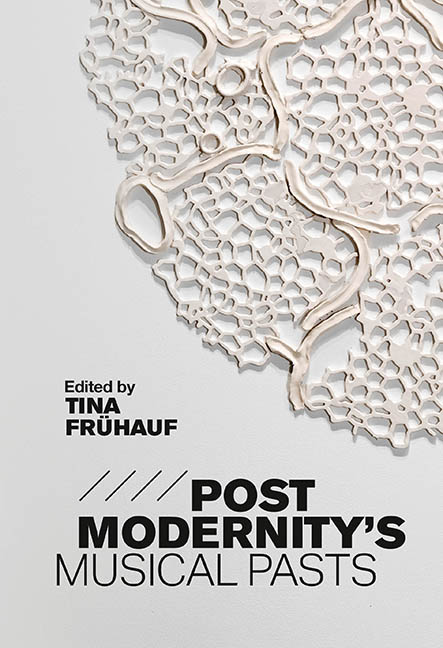Book contents
- Frontmatter
- Dedication
- Contents
- List of Illustrations
- List of Music Examples
- List of Contributors
- Acknowledgments
- About the Cover
- Introduction
- Part I Time and the (Post)Modern
- Part II Manifestations of History
- Part III Receptions of the Past
- Part IV Nostalgias and the Temporalities of Belonging
- Bibliography
- Index
5 - Visions of the ‘End of History’, ‘1968’, and the Emergence of ‘Postmoderne Musik’ in West Germany
Published online by Cambridge University Press: 28 April 2020
- Frontmatter
- Dedication
- Contents
- List of Illustrations
- List of Music Examples
- List of Contributors
- Acknowledgments
- About the Cover
- Introduction
- Part I Time and the (Post)Modern
- Part II Manifestations of History
- Part III Receptions of the Past
- Part IV Nostalgias and the Temporalities of Belonging
- Bibliography
- Index
Summary
In the late 1980s the terms ‘posthistoire’, ‘end of history’, and ‘loss of history’ (henceforth PEL) began to enter the West German discourse on music. Writers on music applied these terms—which had originally been coined in theology, the philosophy of history, and sociology—to music-historical phenomena, first and foremost the latest compositional developments in contemporary music, the so-called ‘postmoderne Musik’. Central for the connection between postmodern music and the PEL terms was the—appropriate or fictional— diagnosis of a crisis of history. German musicologist Ulrich Mosch pointed this out in 1993: ‘With the crisis of the understanding of history … an issue emerges that appears to be essential to a theory of musical postmodernism in both determining the position of musical phenomena with regards to the past as well as the future.’
This essay analyzes the musicological discourse on postmodern music in the long 1990s, when the discourse turned to PEL theories. To provide a foundation, the essay traces the origins of the PEL terms and their meaning in their original context—religious and philosophical thought of earlier periods. It then analyzes to what end they were included in the discourse on (postmodern) music in the long 1990s and how they impacted the discourse in music-historiographical and -aesthetical respects.
The origin of the diverse theories to which the terms refer can be traced back to different periods: the decades after 1945 when the world population looked back at two world wars, the Holocaust, and the dropping of the atomic bomb; the mid-nineteenth century, after the Enlightenment had begun to fade; the mid-eighteenth century and the beginning of the Enlightenment when intellectuals were suffused with optimistic spirit; and as far back as the first to third century bce with the texts of the Tanakh, to be later also canonized as part of the Old Testament. To understand the idea of the ‘end of history’ as it is relevant to the theory on postmodern music, it is necessary to understand its origins in the eighteenth and nineteenth centuries.
- Type
- Chapter
- Information
- Postmodernity's Musical Pasts , pp. 91 - 116Publisher: Boydell & BrewerPrint publication year: 2020



